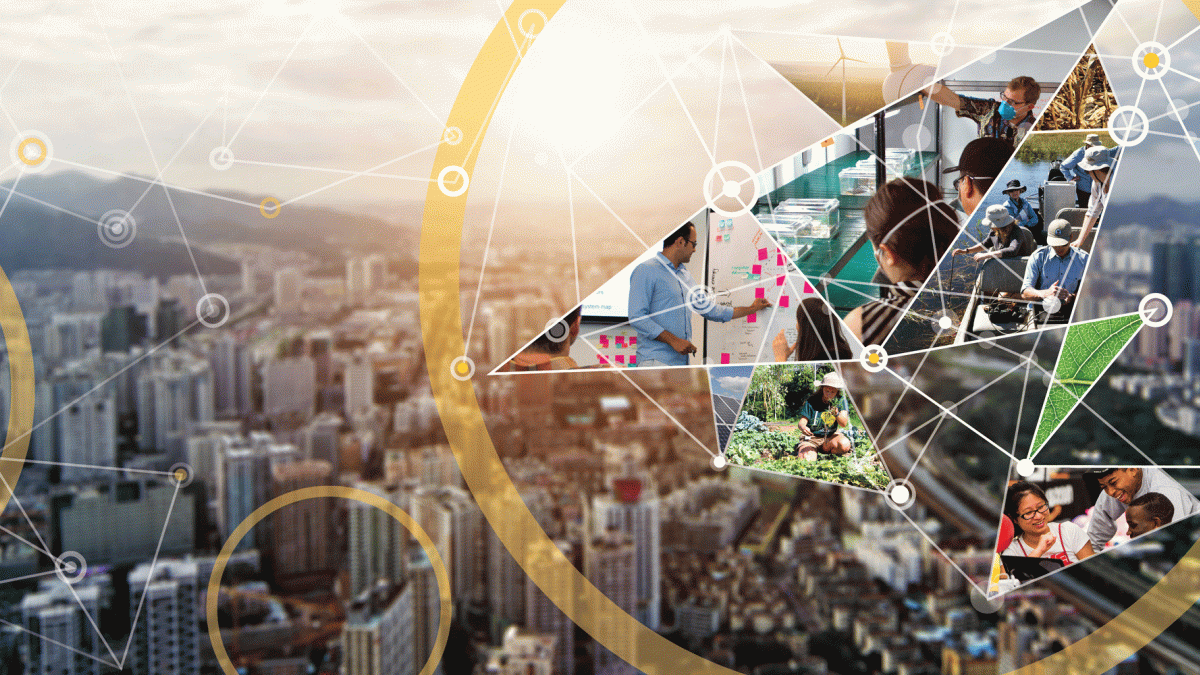Seeking to design a future in which humanity not only survives, but thrives

This article was written by Peter Schlosser, director of the Julie Ann Wrigley Global Institute of Sustainability and vice president and vice provost of Global Futures Laboratory.
Arizona State University’s position as a global leader in sustainability research, education, solutions and engagement is built on the foundation of the Julie Ann Wrigley Global Institute of Sustainability. Today, the institute celebrates its 15th anniversary.
I have been with the Julie Ann Wrigley Global Institute of Sustainability for only a fraction of its 15 years, but I can say with certainty that it is the cornerstone of ASU’s effort in understanding past, present and possible future states of our planet and the pressures from humankind. Our mission is to find ways to relieve these pressures by discovering options for change that focus not on sacrifice but on opportunities to shape a future in which Earth can thrive.
ASU leadership recognizes that the ability to create and apply the knowledge needed to chart a pathway into a sustainable global future requires academia to move beyond traditional research conducted along disciplinary lines. Instead, academia must weave meaningful connections between diverse knowledge systems and the communities and stakeholders who integrate and implement them.
Business-as-usual approaches will no longer suffice to produce the solutions the world urgently needs to address major environmental and societal crises. Now is the time for academics to share knowledge as they are discovering it, so it is integrated as part of the crucial decision-making processes that are already ongoing. Universities need to foster transdisciplinary teams focused on positive impacts and sustainable outcomes, from local to global scales, and work closely with communities to co-produce the knowledge needed for designing a future characterized by hope rather than despair.
Instead of being reactive, we in academia need to be proactive. Rather than solving problems after they arise, we have to anticipate them and avoid them altogether. That has always been the ethos of the ASU Wrigley Institute.
Our sustainability efforts at ASU are rooted in the conviction that we can and must proactively make meaningful contributions to solutions that sustain global habitability and improve well-being for all. This is why sustainability research, education, solutions and engagement at ASU continues to evolve, now with the formation of the Global Futures Laboratory. As the new home to the ASU Wrigley Institute, the Rob and Melani Walton Sustainability Solutions Service and the School of Sustainability, the Global Futures Laboratory is designed to convene stakeholders, thought leaders and practitioners; initiate and advance leading-edge research; and deploy innovative and scalable solutions.
Building upon the accomplishments and active research of the ASU Wrigley Institute and other programs across the university, we are convinced that academia has the power to discover and innovate beyond traditional norms. Together, we seek to design a future in which humanity not only survives, but thrives.
Celebrate 15 years of GIOS
What: A free, public celebration to honor the institute's achievements and envision our collective future. Remarks by Michael Crow and Peter Schlosser, followed by a conversation with Kristin Mayes and Bryan Brayboy. Special message by Johan Rockström, co-chair of the Earth League.
When: Monday, Feb. 17. Reception is at 4 p.m.; remarks and panel discussion from 5-6 p.m.
Where: Marston Exploration Theater in ISTB IV, Tempe campus.
Details: RSVP on the event page.
Learn more about the GIOS journey
More Environment and sustainability

Creating a road map to a balanced planet
When Greg Asner looks out at the world from one of the countless locales he’s visited through his work mapping the planet’s coral reefs and coastal forests — he’s been all over, from the Brazilian…

ASU's water conservation efforts in Tempe make a big impact
A pair of Arizona State University landscaping projects are making a significant impact in the Valley and have dramatically transformed each site into a beacon of sustainability thanks to the…

Saving the environment to save ourselves
Saving the environment.At Arizona State University, that's not just a trendy slogan. From water insecurity to wildfire awareness to cleaning pollutants in urban fishing waterways, ASU is…

